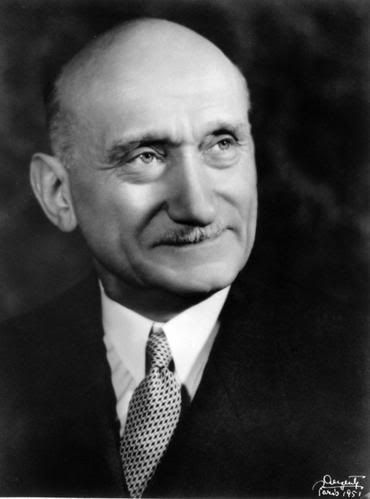 Robert Schuman was born in the fault line of the French-German conflict during the late 19th Century. His father was French from Lorraine, but became a German citizen when the area fell under German control following the Franco-Prussian War. Schuman's mother was from Luxembourg, but took German citizenship after her marriage. Though he learned French at school, he spoke it throughout his life with a distinct accent; he was more fluent in German.
Robert Schuman was born in the fault line of the French-German conflict during the late 19th Century. His father was French from Lorraine, but became a German citizen when the area fell under German control following the Franco-Prussian War. Schuman's mother was from Luxembourg, but took German citizenship after her marriage. Though he learned French at school, he spoke it throughout his life with a distinct accent; he was more fluent in German.He went to high school in Luxembourg, but attended university in Metz, and went on to receive a law degree. Afterward, he became a lawyer and worked for the Metz city council. After World War I, Lorraine and Alsace reverted to France after nearly 50 years of German rule, and he became a French citizen.
In 1940, Schuman was selected -- two months before the Nazi invasion -- to be part of Paul Reynard's wartime government. After France fell, Schuman was captured for "acts of resistance," interrogated by the Gestapo, and almost sent to Dachau.
Instead, he escaped in 1942 and rejoined the French Resistance. At a time when the Reich was at the peak of its power, he spoke of the inevitability of its eventual defeat; even after the Free Zone fell he was convinced that a Franco-German and even a wider European reconciliation would happen after the war.
That was, in fact, what took place, due in part to his influence. As Finance Minister, Prime Minister, and Foreign Minister, he was in a unique position to set the tone for intra-European relations. He helped guide the post-war political scene toward economic and political unity, starting with the European Assembly and the European Coal and Steel Community. He also supported membership in NATO.
Schuman dreamed of a united Europe -- not one under the domination of one dynasty, nation, or personality -- but by such shared values as democracy and human rights.
"We are carrying out a great experiment, the fulfillment of the same recurrent dream that for ten centuries has revisited the peoples of Europe: creating between them an organization putting an end to war and guaranteeing an eternal peace. The Roman church of the Middle Ages failed finally in its attempts that were inspired by humane and human preoccupations. Another idea, that of a world empire constituted under the auspices of German emperors was less disinterested; it already relied on the unacceptable pretensions of a ‘Führertum’ (domination by dictatorship) whose 'charms' we have all experienced." -- May 16, 1949
His courageous dream of a forward-looking Europe differed from its greatest figures of the past. The Merovingians, the popes, the Habsburgs, the nationalists, and the demagogues all pursued a self-centered kind of unity, and all of them failed with time. Instead, it took a modest, celibate, and deeply relgious man to alter the course of European unity.
For his vision, bravery, forgiveness, and multicultural identity, Robert Schuman is today considered the Father of the European Union.

No comments:
Post a Comment